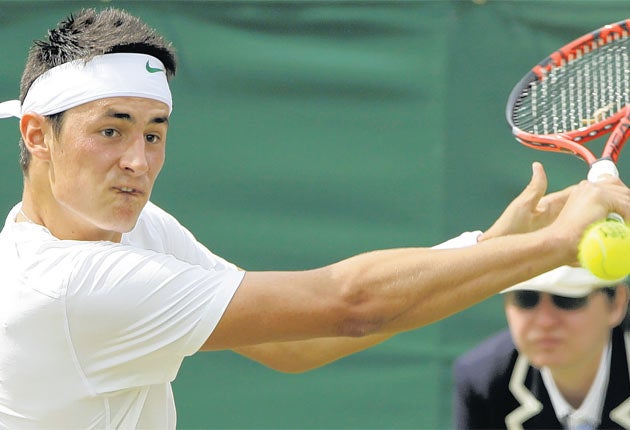Youth shows its promise as the will to win displays itself anew

Despite the consensus that there have only ever been four legitimate contenders, the men's tournament remains animated by plenty of colour and quality on the periphery.
More gratifying still, much of it has been contributed by players who were little more than children when Roger Federer emerged on the Grand Slam scene.
In the gloaming on Thursday, Jo-Wilfried Tsonga had been forced to the limits of his own exotic talent by the 20-year-old Bulgarian, Grigor Dimitrov. At the same time, a couple of other rising stars were being measured on the Grand Slam stage – but their matches could not be completed until yesterday. In both cases, they will have learned a good deal from the way their fortunes transformed overnight.
Bernard Tomic, the Australian 18-year-old, turned round a two-set deficit to beat Igor Andreev 4-6, 5-7, 6-3, 6-4, 6-1. But Ryan Harrison, the other teenager in the draw, lost the initiative against No 7 seed, David Ferrer, to go down 6-7, 6-1, 4-6, 6-3, 6-2. Both these young men must learn to temper their fires, but there is no mistaking the promise they distil for a new generation.
Tomic, fittingly, will next seek to avenge the defeat of his veteran compatriot, Lleyton Hewitt, when he meets Robin Soderling in the third round. In his case, a reputation for insolence is traced in part to a bizarre incident here two years ago, when it was claimed that Tomic's camp had refused a practice session with Hewitt. But they seem to be patching things up now. Hewitt was watching from the players' gallery, and Tomic said that he will seek his counsel on strategy against the big No 5 seed today – "if I see him". Regardless, the symbolism of the moment is completed by the fact that Tomic will now formally overtake Hewitt as the Australian No 1.
He certainly needed all the self-belief of youth to come back from 0-2 down in the third the previous evening. A dual junior Grand Slam winner, he overcame a jittery game when serving for the fourth before storming away with the decider. His return of serve reliably keeps him in the game, and seems increasingly at home on grass.
"That was my first really big test," he said afterwards. "That's the first time in my career I've been down two sets to love and a break down. I think I gave it a shot. I tested myself to get back in that set, and then the rain came, and the nightfall. Today I started to play deeper and faster – that's something I picked up on in the third, when he made a few errors. He doesn't really like to be pushed."
He will need physical precocity on his side, too, Soderling having enjoyed a day's rest. But he is not going to lack self-confidence. Asked about lessons learned from Hewitt's five-set marathon with Soderling, he said: "I think I can serve a little better than Lleyton at this stage. You know, I'm serving real good in the last matches here. So if I can hold my serve, anything can happen."
Harrison, meanwhile, had demonstrated much of the talent that could soon redress a vacancy among the American elite – as well as the temper that has already got him trouble with officials on several occasions. This time he slammed his racket in disgust when Ferrer broke his serve to open the deciding set, while a soft volley to one of the world's top players prompted what is likely to be rebuked as an "audible obscenity". Like Tomic, however, all this froth seems little more than his self-belief brimming over.
"My forehand is as good as anyone's if I'm hitting it well," he pronounced afterwards. "On any given day – obviously I've had some days where it goes off, it goes off more than a guy in the top ten – but if I'm hitting it well, I can hit it to both spots; I can hide it; I can dictate with it." What is more, he is certain he can come back here and win the title some day. "I think I can win this tournament," he said. "Grass suits my game. If I'm serving well, I'm not going to get broken."
His mentor, Andy Roddick, seems to have little doubt. "Everything that's tough for him is going to make him better, too," he said. "Because he cares so much about winning and losing – which I don't think we've had enough of, frankly, in the States [among] the up-and-coming players."
Join our commenting forum
Join thought-provoking conversations, follow other Independent readers and see their replies
Comments
Bookmark popover
Removed from bookmarks